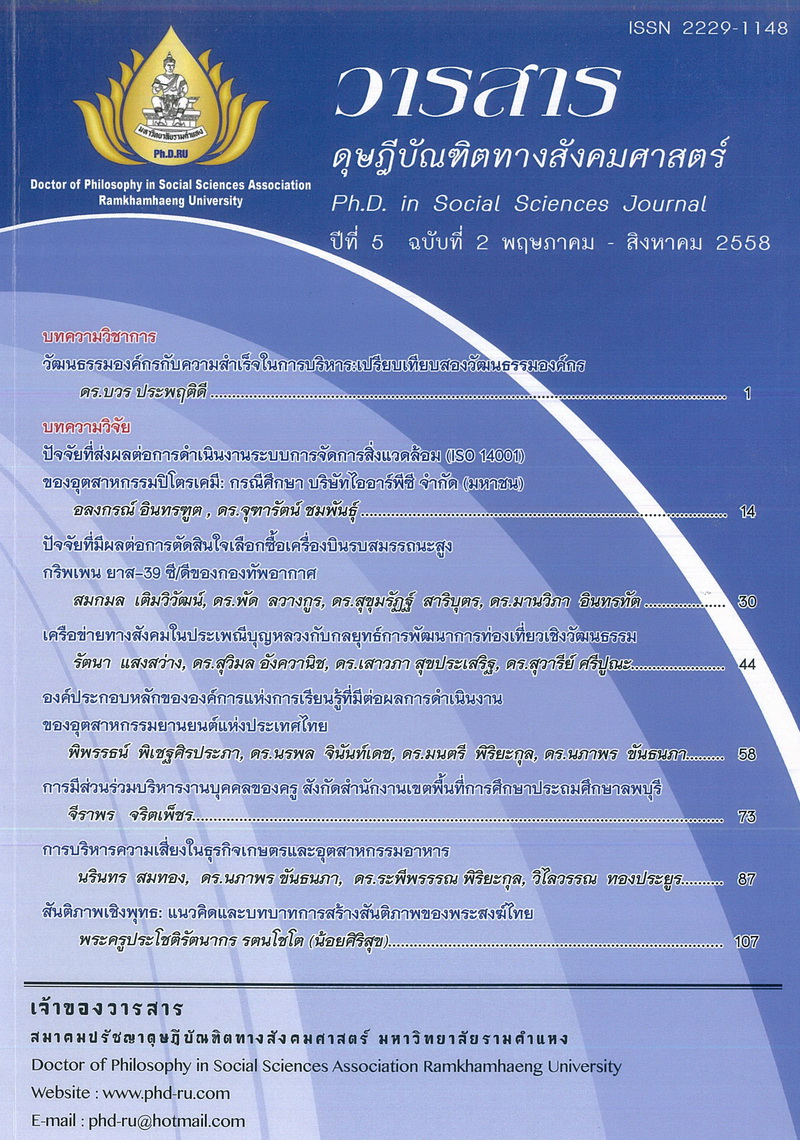ปัจจัยที่ส่งผลต่อการดำเนินงานระบบการจัดการสิ่งแวดล้อม (ISO 14001) ของอุตสาหกรรมปิโตรเคมี: กรณีศึกษาบริษัทไออาร์พีซี จำกัด (มหาชน)
Main Article Content
Abstract
Factors affecting the implementation of Environmental Management System (ISO 14001) of Petrochemical industry: A Case study of IRPC Public Company Limited.
The purposes of this study were to investigate the implementation of the environmental management system by the IRPC Public Company Limited and the factors affecting such implementation, and to suggest to other organizations how to adopt an environmental management system effectively. This study employed the CIPP-I Model, which took into account the factors regarding the contexts, input and output, processes, and impacts of the IRPC’s environmental management system. Data were collected via In-depth Interviews with employees with experience involving the company’s environmental management operations, and stakeholders. The results of the study showed the factors affecting the IRPC Public Company Limited’s environmental management as follows. (1) The context factors included support from the government sector, related laws and regulations, monitoring by government units, the participation of community leaders, clients’ needs, marketing competition, existing environmental problems, and community complaints. It was found that economic conditions did not affect the company’s environmental management operations. (2) Among the input factors, the major factors were adequate number of staff members, the staff’s knowledge and understanding of the environmental management system, adequate trainings for the employees, adequate budget, modern and appropriate technology, support from the executives, the company’s visions, missions, organizational culture, and the integration of various standard control systems. (3) In terms of processes, the company was equipped with policies, purposes, goals, as well as appropriate, clear, and corresponding project plans. In the company there was a unit designated to supervise the implementation of the environmental management system, and information technology was used in the operations. There was constant communication between the company and the community and between the company and other organizations. The company offered opportunities for community participation, for example, training available for contractors. The employees were motivated, and there were regular emergency plan practice sessions. In addition, there was constant monitoring and evaluations as well as continuous reviews for improvement. (4) As for the output factors, the company was successful in following its goals regarding the management system, gaining in return a better and more orderly environment. (5) It was found that, as a result of the environmental management system, there was a decrease in the environmental problems in the community, the people in the community were satisfied and had more positive attitudes toward the company, the operations in the company became more systematic, new technology was employed, and the employees received opportunities for professional development and became more aware of the need for environmental management. In concluding, these factors are keys of success for implementation of the Environmental Management System.
Article Details
Academic articles, research articles, and book reviews in the Ph.D. in Social Sciences Journal are author’s opinions, and not the publisher’s, and is not the responsibility of the Ph.D. in Social Sciences Journal Philosophy Association, Ramkhamhaeng University. (In the case that research is done on human, the researcher has to be trained in Ethics for Doing Research on Human Training and has to produce the evidence of the training).


